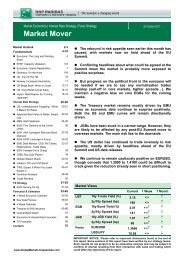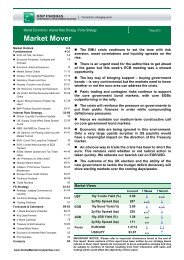Market Economics | Interest Rate Strategy - BNP PARIBAS ...
Market Economics | Interest Rate Strategy - BNP PARIBAS ...
Market Economics | Interest Rate Strategy - BNP PARIBAS ...
Create successful ePaper yourself
Turn your PDF publications into a flip-book with our unique Google optimized e-Paper software.
…average fiscal multiplier is 1, at best<br />
Prime Minister Kan did not say that taxes would be<br />
raised so that fiscal consolidation would bolster<br />
economic growth (non-Keynesian effect!). His<br />
assertion is that the government will hike taxes in<br />
order to increase public spending to boost economic<br />
growth. But does such rhetoric really hold up against<br />
logic and experience? First, logic tells us that<br />
economic entities whose income has been<br />
appropriated by the government via higher taxes will<br />
naturally cut back on spending. Assuming the<br />
government does not squander the money<br />
appropriated, the increased spending by the<br />
government will have zero effect (the plus of<br />
government spending will just offset the minus of<br />
reduced spending by the taxed economic entities).<br />
The balanced budget multiplier is 1. In truth, however,<br />
the multiplier is probably lower as the government’s<br />
ability to use tax money more efficiently than the<br />
private sector is questionable.<br />
Advocating more macro-stabilisation?<br />
Now, if the government increases spending at a time<br />
when there are substantial idle resources due to<br />
recession, with the assumption being that taxes will<br />
be hiked when the economy is expanding, the fiscal<br />
multiplier would be higher. This could be what Kan<br />
has in mind. But this is just a case of macrostabilisation,<br />
which can temporarily support a falling<br />
growth rate. Bolstering the potential growth rate is a<br />
different matter completely. The prime minister’s<br />
argument seems to mix up macro-stabilisation and<br />
policies to correct structural defects.<br />
Even if it is macro-stabilisation, there is little evidence<br />
that the tax money spent by the government with the<br />
aim of promoting economic growth is spent<br />
effectively. In any event, because Japan’s huge<br />
public debt must be repaid sometime in the future,<br />
the fiscal multiplier should, from a long-term<br />
perspective, be deemed less than 1. That is why we<br />
are so adamant that, except for emergencies, fiscal<br />
policy should never be used as economic stimulation.<br />
Since Japan’s growth rate is low not just for cyclical<br />
reasons but also because of structural problems,<br />
macro-stabilisation is not the right response. The<br />
lesson from Japan’s experience over the past twenty<br />
years, in our view, is that repeated use of macrostabilisation<br />
depresses the long-term performance of<br />
the economy.<br />
Will spending on social infrastructure bolster<br />
potential growth?<br />
Of course, the potential growth rate can be boosted if<br />
the government supplies the infrastructure that<br />
private economic entities cannot. In cases of market<br />
failure, if the government uses income appropriated<br />
from the private sector via tax hikes to complete<br />
needed social infrastructure, the potential growth rate<br />
can be raised thanks to the resulting improved<br />
convenience and return on capital for the private<br />
sector. But can such public investment projects really<br />
be implemented? Unfortunately, more often than not,<br />
the government errs in selecting projects, with the<br />
result that the authorities’ heavy meddling in the<br />
private sector leads to reduced return on capital for<br />
private economic entities – in turn weighing on the<br />
potential growth rate. There certainly are necessary<br />
public investment projects that are never<br />
implemented, but the reason seems not to be the<br />
lack of money. Consequently, there is no guarantee<br />
that tax hikes would actually translate into the<br />
creation of social infrastructure that bolsters potential<br />
growth.<br />
Will spending on nursing/healthcare yield greater<br />
economic growth?<br />
Rather than government spending in general, let’s<br />
consider the specific case of expenditure on<br />
nursing/healthcare. Most people would probably<br />
support the assertion that “tax hikes to increase<br />
government spending on healthcare and nursing<br />
would boost economic growth”. Since we have long<br />
argued that a big reason why Japanese save rather<br />
than spend is due to anxieties about the future,<br />
linked to Japan’s deficient social welfare systems, we<br />
do not want to reject this proposition outright. But we<br />
have one misgiving. The overriding problem in the<br />
nursing and healthcare sector is not the lack of<br />
money but unnecessary government regulation that<br />
prevents the provision of nursing and healthcare<br />
services that people want. Thus, since the problem is<br />
in the design of these systems, increasing<br />
government spending alone won’t result in the<br />
provision of better services. What is needed is<br />
deregulation. Without it, more government spending<br />
will just waste more money, while also weakening the<br />
nation’s economic welfare.<br />
Problem is unnecessary regulations, not the lack<br />
of resources<br />
Nursing and healthcare will not be growth industries<br />
if they become public services funded by tax money.<br />
Growth industries are born when service providers<br />
appear that supply the services people are willing to<br />
pay for. In the case of nursing/healthcare, only those<br />
actually consuming the service are in a position to<br />
know if they are getting value for money; the<br />
government should not make such decisions. If the<br />
problem is deemed to be insufficient resources and<br />
government spending is increased, as pointed out<br />
earlier, the economic effect will be zero, as the plus<br />
from increased spending in nursing/healthcare will<br />
just offset the minus of reduced spending by the<br />
economic entities that have had income taken away<br />
Ryutaro Kono 16 July 2010<br />
<strong>Market</strong> Mover<br />
19<br />
www.Global<strong>Market</strong>s.bnpparibas.com
















